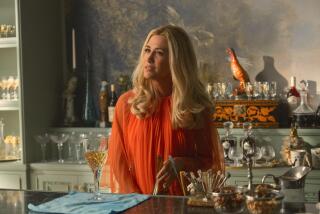‘Pearl of China’ by Anchee Min
- Share via
The “pearl” in the title of Anchee Min’s sixth novel, “Pearl of China,” is the Nobel Prize-winning author Pearl S. Buck, who died in 1973 and spent much of her life in China. Min’s latest — which explores the friendship between Buck and a Chinese girl called Willow — is a tribute to the author, as well as an act of expiation, as she explains in an author’s note.
“I was ordered to denounce Pearl Buck in China,” she writes. “The year was 1971. … Trying to gain international support for rejecting Buck’s China entry visa [to accompany President Nixon on his visit], Madame Mao organized a national campaign to criticize Buck as an ‘American cultural imperialist.’ I followed the order and never questioned whether Madame Mao was being truthful.”
The political ploy worked, and Buck was denied entry. She died a year later, heartbroken that she’d been unable to return to the nation she loved so much.
The teenage Min, who had never been allowed to read “The Good Earth,” nonetheless dutifully dismissed it as dangerous, hateful and insulting. It wasn’t until 1996 that Min, who had immigrated to the U.S. and taught herself English, read the novel and “broke down and sobbed.” (Min’s novels, by the way, are still banned in China.) It’s obvious that the connection she feels to Buck is profound — she even dedicates the novel to her — which makes “Pearl of China’s” failure to captivate all the more unfortunate.
Narrator Willow Yee lives with her grandmother, NaiNai, and her father in Chen-kiang, on the south side of the Yangtze River in the Jiangsu province. She and her father work as farmhands, and her most salient memory of childhood is hunger. By the time she’s 8, in 1898, Willow is a veteran thief, stealing whatever her father can sell so the family can eat.
When she meets a young girl named Pearl, whose parents, Absalom and Carie Sydenstricker, are Presbyterian missionaries, her life is transformed. (They meet after Pearl catches Willow stealing Absalom’s wallet.) Willow’s father, meanwhile, becomes caught up in Absalom’s proselytizing, and eventually they create the largest Christian community in southern China.
The sweeping narrative follows Willow and Pearl over a lifetime, including Willow’s forced engagement at 14, unhappy marriages for both women and the rift that occurs as they fall in love with the same Chinese poet. Yet even as they are pulled apart by political forces and geography, their bond endures. In later years, when Willow is ordered to denounce her friend (just as Min was brainwashed to do), she refuses and pays a steep price.
The sentiment behind “Pearl of China” is admirable, but it doesn’t succeed on a storytelling level or in treating Pearl Buck as anything but a familiar historical figure. Too often the author moves through history in an oddly perfunctory way, and because Pearl’s life is recounted solely from Willow’s perspective, it’s a dry and distant account: “In 1932, [Pearl] had won the Pulitzer Prize for ‘The Good Earth’ while still among us. In 1938, she won the Nobel Prize for literature.”
Nor are Willow’s letters to Pearl interesting: “How happy I am to learn that you have been well and are in good health,” she writes. The letters seem like a cheap device to move the narrative along but accomplish little else. It’s also problematic that one of the novel’s most exciting moments occurs when Madame Mao makes an appearance. Mostly, it reads more like a biographical account than a novel brimming with drama, heartache, civil war and loss.
The weaknesses apparent in “Pearl of China” are glaring only because Min is such a gifted and lyrical writer, usually so attentive to detail, as anyone familiar with her work knows well. She has explored China’s tumultuous history, and her own, in infinitely richer ways, as in her bestselling memoir, “Red Azalea,” and dazzling novels such as “Becoming Madame Mao.” At her best, Min has the power to transport readers to exotic and fascinating locales, which means her next novel should be something to look forward to.
Ciuraru is the editor of poetry anthologies, including, most recently, “Poems About Horses.”
More to Read
Sign up for our Book Club newsletter
Get the latest news, events and more from the Los Angeles Times Book Club, and help us get L.A. reading and talking.
You may occasionally receive promotional content from the Los Angeles Times.








